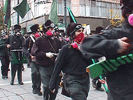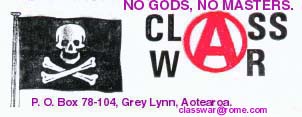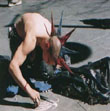 |

|
 |
 |

|
 |
CLASS WAR May Day.
THE ANARCHIST ORIGINS OF MAY DAY
Today
it is just another day. Not many people know why
May Day became International Workers Day and why we
should still celebrate it. One more piece of our
history which has been hidden from us. It all began
over a century ago when the American Federation of
Labour adopted an historic resolution which asserted
that “eight hours shall constitute a legal day’s
labour from and after 1 May 1886”.
In
the months prior to this date workers in their
thousands were drawn into the struggle for the shorter
day. Skilled and unskilled, black and white, men and
women, native and immigrant were all becoming
involved.
CHICAGO
In Chicago alone 400,000 were out on strike. A
newspaper of that city reported that “no smoke curled
up from the tall chimneys of the factories and mills,
and things had assumed a Sabbath-like appearance”.
This was the main centre of the agitation, and here
the anarchists were in the forefront of the labour
movement. It was to no small extent due to their
activities that Chicago became an outstanding trade
union centre and made the biggest contribution to the
eight-hour movement.
When
on 1 May 1886, the eight-hour strikes convulsed
that city, one half of the workforce at the McCormick
Harvester Co. come out. Two days later a mass meeting
was held by 6,000 members of the “lumber shovers”
union who had also come out. The meeting was held only
a block from the McCormick plant and was joined by
some 500 of the strikers from there.
The workers listened to a speech by the anarchist
August Spies, who had been asked to address the
meeting by the Central Labour Union. While Spies was
speaking, urging the workers to stand together and not
give in to the bosses, the strikebreakers were
beginning to leave the nearby McCormick plant.
The
strikers, aided by the lumber marched down the
street and forced the scabs back into the factory.
Suddenly a force of 200 police arrived and, without
any warning, attacked the crowd with clubs and
revolvers. They killed at least one striker, seriously
wounded five or six others and injured an
indeterminate number.
Police
attack workers, 4th May 1886
Click picture to view
a larger version.
Outraged
by the brutal assaults he had witnessed,
Spies went to the office of the Arbeiter Zeitung
(a
daily anarchist newspaper for German immigrant
workers) and composed a circular calling on the
workers of Chicago to attend a protest meeting the
following night.
Poster,
3rd May 1886
Click poster to view
a larger version.
The protest meeting took place in the Haymarket Square
and was addressed by Spies and two other anarchists
active in the trade union movement, Albert Parsons and
Samuel Fielden.
THE
POLICE ATTACK
Throughout the speeches the crowd was orderly. Mayor
Carter Harrison, who was present from the beginning of
the meeting, concluded that “nothing looked likely
to
happen to require police interference”. He advised
police captain John Bonfield of this and suggested
that the large force of police reservists waiting at
the station house be sent home.
It
was close to ten in the evening when Fielden was
closing the meeting. It was raining heavily and only
about 200 people remained in the square. Suddenly a
police column of 180 men, headed by Bonfield, moved in
and ordered the people to disperse immediately.
Fielden protested “we are peaceable”.
BOMB
At this moment a bomb was thrown into the ranks of the
police. It killed one, fatally wounded six more and
injured about seventy others. The police opened fire
on the spectators. How many were wounded or killed by
the police bullets was never exactly ascertained.
A
reign of terror swept over Chicago. The press and
the pulpit called for revenge, insisting the bomb was
the work of socialists and anarchists. Meeting halls,
union offices, printing works and private homes were
raided. All known socialists and anarchists were
rounded up. Even many individuals ignorant of the
meaning of socialism and anarchism were arrested and
tortured. “Make the raids first and look up the law
afterwards” was the public statement of Julius
Grinnell, the state’s attorney.
TRIAL
Eventually eight men stood trial for being
“accessories to murder”. They were Spies,
Fielden,
Parsons, and five other anarchists who were
influential in the labour movement: Adolph Fischer,
George Engel, Michael Schwab, Louis Lingg and Oscar
Neebe.
The
trial opened on 21 June 1886 in the criminal court
of Cooke County. The candidates for the jury were not
chosen in the usual manner of drawing names from a
box. In this case a special bailiff, nominated by
state’s attorney Grinnell, was appointed by the court
to select the candidates. The defence was not allowed
to present evidence . The special bailiff had publicly
claimed, "I am managing this case and I know what
I am
about. These fellows are going to be hanged as certain
as death”.
RIGGED
JURY
The eventual composition of the jury was farcical;
being made up of businessmen, and a relative of one of
the dead policemen. No proof was offered by the state
that any of the eight men before the court had thrown
the bomb, had been connected with its throwing, or had
even approved of such acts. In fact, only three of the
eight had been in Haymarket Square that evening.
No
evidence was offered that any of the speakers had
incited violence, indeed in his evidence at the trial
Mayor Harrison described the speeches as “tame”.
No
proof was offered that any violence had been
contemplated. In fad, Parsons had brought his two
small children to the meeting.
SENTENCED
That the eight were on trial for their anarchist
beliefs and trade union activities was made clear from
the outset. The trial closed as it had opened, as was
witnessed by the final paragraph
of Attorney Grinnell’s summation speech to the jury.
“Law is on trial. Anarchy is on trial. These men
have
been selected, picked out by the Grand Jury, and
indicted because they were leaders. There are no more
guilty than the thousands who follow them. Gentlemen
of the jury; convict these men, make examples of them,
hang them and you save our institutions, our society.”
On
19 August seven of the defendants were sentenced to
death, and Neebe to 15 years in prison. After a
massive international campaign for their release, the
state compromised and commuted the sentences of Schwab
and Fielden to life imprisonment. Lingg cheated the
hangman by committing suicide in his cell the day
before the executions. On 11 November 1887 Parsons,
Engel, Spies and Fischer were hanged.


Two
of the martyrs of Haymarket. Michael Schwab (left) was not even at the meeting
when the bomb was thrown.
He left before the speakers began to go and address a rally at the Deering Reaper
Works
PARDONED
600,000 working people turned out for their funeral.
The campaign to free Neebe, Schwab and Fielden
continued.
26 June 1893 Governor Altgeld set them free. He made
it clear he was not granting the pardon because he
thought the men had suffered enough, but because they
were innocent of the crime for which they had been
tried. They and the hanged men had been the victims of
“hysteria, packed juries and a biased judge”.
The authorities had believed at the time of the trial
that such persecution would break the
back of the eight-hour movement. Indeed, evidence
later came to light-that the bomb may
have been thrown by a police agent working for Captain
Bonfield, as part of a conspiracy involving certain
steel bosses to discredit the labour movement.
When
Spies addressed the court after he had been
sentenced to die, he was confident that this
conspiracy would not succeed. “If you think that
by
hanging us you can stamp out the labour movement...the
movement from which the downtrodden millions, the
millions who toil in misery and want, expect salvation
— if this is your opinion, then hang us! Here you will
tread on a spark, but there and there, behind you —
and in front of you, and everywhere, flames blaze up.
It is a subterranean fire. You cannot put it out.”
REVOLUTIONARY
POLITICS
One hundred and nine years after that first May Day
demonstration in Chicago, where are we? We stroll
through town with our union banners — about the only
day of the year we can get them out of head office.
Then we stand around listening to boring (and usually
pretty meaningless) speeches by equally boring union
bureaucrats. You have to keep reminding yourself that
May Day was once a day when workers all over the world
displayed their strength, proclaimed their ideals and
celebrated their successes.
It
is important that “once upon a time” it was like
that. We can do it again. We need independent working
class politics. No collaboration with government and
bosses. Defiance of the Employment Contracts Act, not
passively giving up like the CTU did. Real solidarity
with fellow workers in struggle, not a blinkered
sectional outlook. We still need a further reduction
in working hours, without loss of pay, to make work
for the unemployed
.
We need revolutionary politics. That means politics
that can lead us towards a genuine socialism where
freedom knows no limit other than not interfering with
the freedom of others. A socialism that is based on
real democracy — not the present charade where we can
choose some of our rulers, but may not choose to do
without rulers. A real democracy where everyone
affected by a decision will have the opportunity to
have their say in making that decision. A democracy of
efficiently coordinated workplace and community
councils. A society where production is to satisfy
needs, not to make profits for a privileged few.
Anarchism.
For better impact at Mayday and other protests, learn our song: THE BLACK FLAG.
More about Mayday | Pictures l Contact us l Home l Links l Campaigns | Products